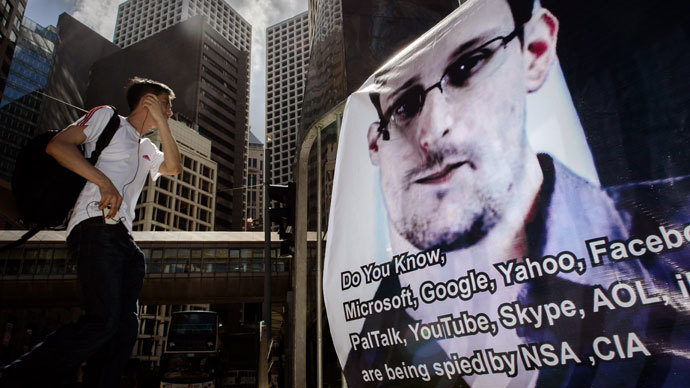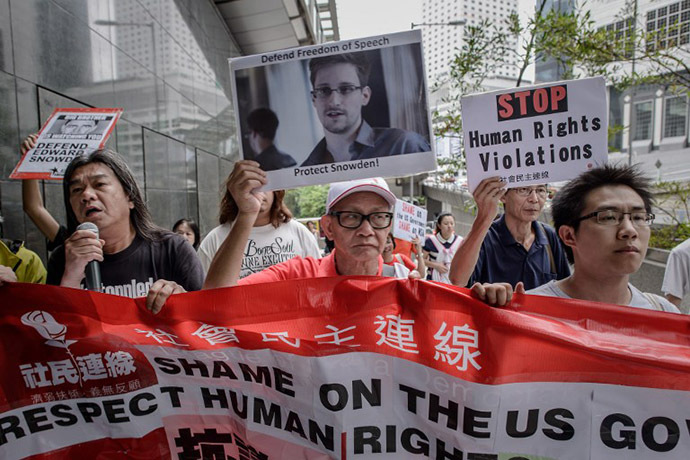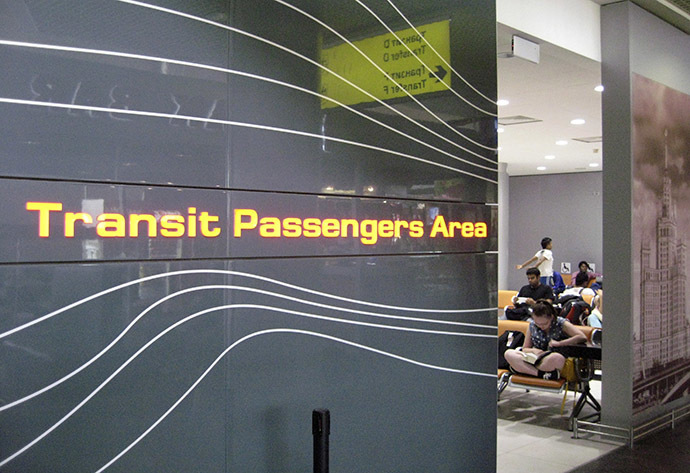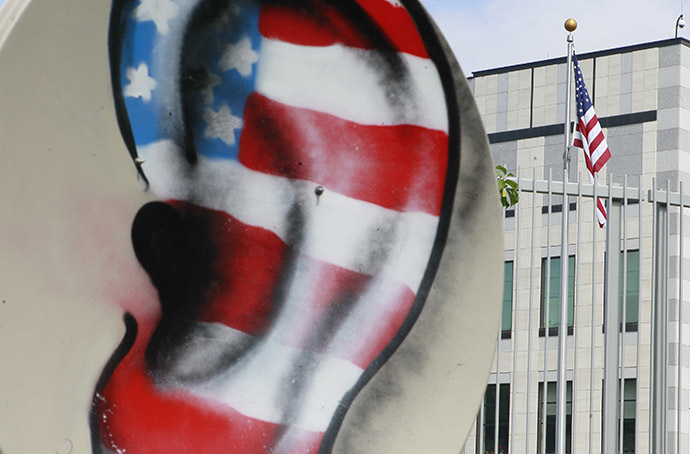Wanted: Russia and China as villain in Snowden affair

Amidst the manhunt for former NSA staffer Edward Snowden, who is presently stuck in the transit zone at Moscow’s Sheremetyevo Airport, some US observers are displaying the hypocrisy that comes with hyper-power, accusing Russia of not being a true ally.
US media is busy typecasting Russia as the villainous antagonist in this made-for-Hollywood tale of non-fiction that pits a lonely whistleblower from the National Security Agency (NSA) against the very government – and even girlfriend - he betrayed.
And as if to purposely taunt his imperial pursuer, Snowden has
chosen the longest, most arduous route on the road to Ecuador.
Indeed, the 29-year-old - who threw a spotlight on an
ultra-secret NSA data-mining surveillance program - did not board
a boat to Havana after blowing the whistle on his employer, and
not because Guantanamo Bay detention facility is still lurking on
the horizon. Snowden was looking for maximum exposure, cause
celebre, as it were. And like Julian Assange of WikiLeaks
notoriety, he is certainly getting it.

First stop: Hong Kong. Snowden's first choice of destination prior to divulging his secrets was not only an intelligence nightmare for the US, it was also a bit embarrassing: As early as May, the US authorities were pointing the imperial finger at Beijing for targeting cyber-attacks on US government computers.
“In 2012, numerous computer systems around the world,
including those owned by the US government, continued to be
targeted for intrusions, some of which appear to be attributable
directly to the Chinese government and military,” the report
read.
Not surprisingly, the Chinese authorities denied the accusation.
However, the embarrassment was nothing when we consider the
uncanny knack the Chinese have for copying, and even improving,
every gadget under the sun - from sneakers to satellites - which
makes Snowden’s choice of the quasi-commie, quasi-capitalist
regime all the more sensational and potentially dangerous to
long-term American interests. What kind of a gnarly tree will
grow out of the kernel of information the Chinese may have
skimmed from Snowden’s laptop is anybody’s guess.
Next stop: Moscow. Since Sunday, Edward Snowden has been spending what must be some very uncomfortable nights in the transit zone of Sheremetyevo Airport. Whether the American is permitted to shop around Duty Free between arriving flights is anybody’s guess, but clearly, the life of a whistleblower on the lam is no piece of cake.

US Secretary of State John Kerry expressed indignation that
neither China nor Russia seems overly inclined to return missing
American property.
“It would be deeply troubling, obviously, if they had adequate
notice, and notwithstanding that, they make the decision
willfully to ignore that and not live by the standards of the
law,” Kerry said
Meanwhile, US media continues to bemoan Washington’s inability to
sway Moscow and Beijing to behave in accordance with its
"will."
“For the moment, Moscow appears to be holding firm against
Washington’s demands,” lamented The Washington Post.
“Within the United States, that’s prompted some alarm over not
just Russia’s refusal – which is not shocking – but America’s
apparent inability to force its will on the issue.”
After all, it has almost become second nature for the United
States to resolve its issues with foreign countries not with the
subtlety of the diplomatic pen, but increasingly with the
brutality of the sword.
“From Washington’s point of view, Snowden is an American
fugitive wanted on serious charges, hanging out at the Moscow
airport, and we can’t even compel his release,” the article
continued. “Whatever happened to American power
abroad?”
After reading this hunk of hubris on steroids one is tempted to believe that defense industry contractors will be receiving a windfall in government subsidies just because of a young, idealistic computer technician.
Russian officials say they lack the legal authority to detain Snowden - whose passport has been canceled by US authorities - no less to hand him over.
“The Americans can’t demand anything,” human-rights ombudsman Vladimir Lukin told Interfax, saying that as long as Snowden did not leave the Moscow airport’s transit zone, he was not officially on Russian soil and could not be seized.
Meanwhile, another US commentator said Moscow is not cooperating in the Snowden case because it enjoys the spectacle of humiliating Washington.
According to Michael Hirsh, writing for The Atlantic, “The
Russian leader enjoys humiliating Washington, so the Obama
administration shouldn't expect much help from him in nabbing the
NSA leaker.”
Yet, as Hirsh admits, Vladimir Putin himself emphasized he didn't
want the NSA whistleblower loitering around a Russian airport,
saying "the sooner he chooses his final destination, the
better it is for him and Russia."
Nevertheless, the author jumps to the conclusion that “Russia's foreign policy is largely shaped by its leader's desire to meddle with America and its designs around the world.”
Hirsh uses as examples global hotspots, specifically in Syria (“with Putin backing Bashar Assad against the US-aided rebels”); Iran (“where Moscow opposes too-stringent sanctions and is building a reactor”); or missile defense (“where Putin pressured President Obama to retreat from a missile-defense system, angering the Poles and the Czech Republic”) where Moscow and Washington hold different views on what course of action should be taken.
But for Hirsh, Moscow daring to question Washington’s decisions - which were proven to be occasionally wide of the mark, especially after the intelligence failure that led to the disastrous war in Iraq, and later in Libya – is exactly the source of the problem: Another country – Russia - is actually attempting to second-guess and even disagree (gasp!) with America’s “designs around the world,” as Hirsh not-so-delicately puts the matter.
Meanwhile, the revelations made available by Snowden show without a doubt that Washington has not always been a straight-dealing partner with Moscow, even at the best of times.
As The Guardian reported, “American spies based in the UK
intercepted the top-secret communications of the then-Russian
President Dmitry Medvedev during his visit to Britain for the G20
summit in London, leaked documents reveal.” So much for
trusting gratuitous internet cafes at international summits.

The details of the intercepted messages were shared with high-ranking officials from Britain, Australia, Canada and New Zealand, it noted. It goes without saying that this information drew some raised eyebrows in Moscow, exactly as it did in European capitals.
Although the intelligence gleaned from the surveillance may have amounted to nothing more interesting than what the Russian leader ordered for lunch, the reports of eavesdropping did nothing to invigorate the lackluster US-Russia reset. Despite these reports, it is the US that thinks Russia is trying to “humiliate” it over the Snowden affair.
Considering the history of Russia-US bilateral relations since the collapse of the Soviet Union, is it really fair to say that Russia in general and Putin in particular “enjoys humiliating Washington”? It seems, if we’re going to split hairs on the matter, that exactly the opposite is true.
It is enough to consider the ongoing controversy over the US missile defense shield going up in Eastern Europe, just miles from the Russian border, together with the eastward spread of NATO, which some say should have been disbanded following the demise of the Warsaw Pact.
On the question of missile defense in Europe, Obama initially shelved the plan back in 2009; it didn’t stay on the shelf long (and to set the record straight, it was not Putin who angered the Czechs and the Poles over missile defense, as Hirsh suggests, but rather their own governments, who were pushing for the US system despite heated local objections to the plan. Not only that, but Dmitry Medvedev was Russia’s president at the time).
Today, as with so many other seamless transitions between the foreign policy objectives of Bush and Obama, the system is not only a reality, it threatens to trigger another arms race as Russia fully understands that nuclear-missile disarmament in the face of a mighty shield on the frontier is, potentially, geopolitical suicide on the grand chessboard. Why is the United States and its NATO allies so determined to push ahead with an unproven missile system, to defend against an unproven enemy, with the risk of permanently alienating Russia, a proven ally? It makes no sense.
The issue goes beyond merely the question “humiliating the United States,” of course, which is probably the worst offense that may be committed against a ego-tripping superpower. America has become so arrogant in its demands that it accuses Russia of "humiliating" behavior because Moscow refuses to give Washington strategic advantage!
So now that it has been revealed that the NSA was actively collecting surveillance on Russian leaders at prominent international gatherings, this may not be the best time to criticize Moscow’s lack of enthusiasm, or its desire to “humiliate” the US, when it comes to the handling of Snowden.
In the final analysis, whistleblowers are always going to be with us, at least until the computers can do without the need for human intervention. No matter what kind of security firewalls we place on our sophisticated computer systems, no foolproof system has been devised that could remove the judgment of individuals - complete with conscience and reasoning abilities - from the final analysis. For security experts, the human being represents the weak link in their system; for civil rights groups, the human component is a safety valve, the last line of defense, as it were, that prevents us from being victimized by some Orwellian surveillance state.
Robert Bridge is the author of the book, Midnight
in the American Empire, which examines the dangerous
consequences of extreme corporate power now prevalent in the
US.
The statements, views and opinions expressed in this column are solely those of the author and do not necessarily represent those of RT.
The statements, views and opinions expressed in this column are solely those of the author and do not necessarily represent those of RT.












